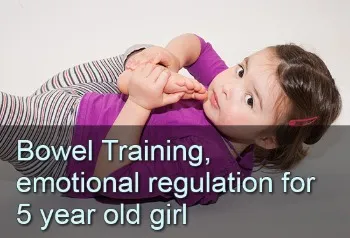Primitive Reflex Integration Case Studies
Bowel Training, Emotional Regulation for 5-Year-Old Girl
Rhythmic movements help with soiling, self-regulation, and transitions.
Despite early intervention, this preschooler had daily bowel accidents, sensory processing and anxiety issues, tantrums, and difficulty with transitions. After just 4 weeks of receiving rhythmic movements from the Brain and Sensory Foundations program, she had easier transitions, fewer tantrums, and was completely bowel trained!
Submitted by Jenny Jolley, MS, OTR/L

| Before | After |
|---|---|
| Difficulty transitioning | Smooth transition between activities |
| Lengthy melt-downs | Fewer and less intense tantrums |
| Bowel incontinence | Potty trained |
My client is a 5-year-old girl who required surgery one week after birth to correct a deformity. She had extensive early intervention of PT and OT to address delayed milestones and sensory processing. When she came to me, she had "plateaued" and was discharged about a year before.
Her mother’s concerns were that her daughter experienced irrational behavior that was easily triggered with minimal stimulus, difficulty with transitioning, hypermobile joints, fearful/wallflower reports from preschool, lengthy melt-downs that were very difficult to calm down, and her greatest concern: bowel incontinence.
Megan had daily complaints from her preschool about bowel-movements in her underwear with no appropriate reporting to the teacher, and the same occurred at home. Although she exhibited above-average intelligence, she had no concern for bowel accidents and would justify them with “I’ll just change my panties." Her family was very frustrated.
When I started with her, it was actually before taking the online Brain and Sensory Foundations course, so our focus was on overall strengthening to reduce joint mobility and gentle exposure to sensory input to improve her sensory processing. Megan made excellent progress in strengthening, but she continued to have irrational fears, meltdowns, and no gains in bowel-training. I began taking the online Brain and Sensory Foundations course four months into her treatment and began using the rhythmic movements with her for 15 minutes a session.
I continued to faithfully complete all positions for 15 minutes a session, two times a week.
Initially, Megan would resist the direction to do Rhythmic Movement, but within two weeks, she was happy to participate in the movements both actively and passively. She began to transition between activities easily and had fewer and less intense tantrums when she was overwhelmed or didn’t get her way. She began to be a much easier child to work with.
The most profound change occurred after 4 weeks of Rhythmic Movement, only two times a week for 15 minutes (At this time here was no home movement program being done for Megan). She became bowel-trained. Her mother reported the last two weeks before she discharged: she had no accidents.
[Edited for length and clarity, emphasis added]
*Disclaimer: The activities in the Brain and Sensory Foundations curriculum make use of the natural processes of neuroplasticity and development that are innately wired in the design of human beings to promote maturity and function. These activities appear to calm, organize, and mature the neuro-sensory-motor systems just as we see in the healthy development of human infants. Individual results may vary, and we do not claim to offer a diagnosis or cure for any specific condition or disorder. The Brain and Sensory Foundations activities appear to improve overall functioning resulting in measurable improvements for a range of conditions as demonstrated in over 1800 case studies from participants.

